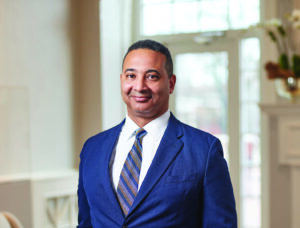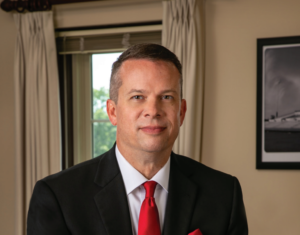By: Felipe Rivas
2 min read December 2020 — Charlotte’s popularity as a destination city for people and businesses alike is feeding an overwhelming demand for quality talent across the STEM fields. Private liberal arts educational institutions are at the helm of cultivating a holistic educational experience for students while meeting the needs of the local workforce. Institutions such as Queens University of Charlotte and Gardner-Webb University are keenly focused on ensuring graduates have all the skills needed to enter the dynamic Charlotte workforce. Dan Lugo, president of Queens University of Charlotte, and William Downs, president of Gardner-Webb University, spoke to Invest: Charlotte about the value their schools bring to the local community and their vision for the future of their respective institutions.
How will finances and pricing evolve and how will that influence enrollment?

Dan Lugo: There has clearly been a trend toward questioning the long-standing tradition of two pricing structures: one for private institutions, one for public institutions. We believe there is going to be more variability and differentiation. The demand is increasing for colleges and universities to demonstrate value and the return on investment. We feel strongly about the return on investment of a great Queens education and we can demonstrate it. Our first report on the graduating class of 2019 found 97% are working or in graduate school. We have an educational approach that is built on the distinctive liberal arts foundation, combined with meaningful professional access and professional degree programs. We extend into the professional world with the requirement of multiple internships and partnerships with the civic, corporate, and nonprofit communities in Charlotte. We feel good about sustaining our market price where others are going to have a harder time defending their price point.
 William Downs: We are a faith-based institution, our institutional motto is “For God and Humanity,” and we have built our academic programs around serving the people of the foothills and in Western North Carolina. Despite all of the uncertainties of COVID-19 and the financial stresses it has placed on families across our region, our entering freshman class in August of 2020 was 17.7% larger than last year’s entering freshman class. Our finances are in good shape and we are sitting on zero positive COVID-19 cases even though we never closed. We moved classes online in March but had at least 250-300 students on campus, living, eating and studying through the remainder of the spring and summer terms. Our fall semester residential population of 1,200 students has successfully navigated all the health safety measures we put in place, and they reached the finish line in excellent shape.
William Downs: We are a faith-based institution, our institutional motto is “For God and Humanity,” and we have built our academic programs around serving the people of the foothills and in Western North Carolina. Despite all of the uncertainties of COVID-19 and the financial stresses it has placed on families across our region, our entering freshman class in August of 2020 was 17.7% larger than last year’s entering freshman class. Our finances are in good shape and we are sitting on zero positive COVID-19 cases even though we never closed. We moved classes online in March but had at least 250-300 students on campus, living, eating and studying through the remainder of the spring and summer terms. Our fall semester residential population of 1,200 students has successfully navigated all the health safety measures we put in place, and they reached the finish line in excellent shape.
How are you broadening your curriculum in tandem with your liberal arts focus?
Lugo: The liberal arts and STEM programs have been working in tandem for quite some time. Our origins are rooted in the liberal arts and the sciences. We have great life sciences programs, symbolized by Rogers Hall, where we deliver robust chemistry, biochemistry and biology programs that are leading students to STEM destinations. This is in addition to programs in our Blair College of Health, including exercise and sport sciences which has a 100% success rate in graduates being accepted into Doctor of Physical Therapy programs; as well as our very competitive nursing program.
We have a deep tradition of guiding our students into STEM fields that we want to enhance by infusing exposure to data analytics and large-scale data modeling. Those are the graduates who are most desperately needed right now, especially considering how Charlotte’s job market is evolving. We’re currently setting the foundation of our strategic planning, which is going incredibly well. We’re thinking about ways to embed data analytics expertise across our curriculum. Due to our location and existing relationships, we are uniquely positioned to work with the for-profit community in Charlotte to cater to their talent needs. This would include creating the right type of synergies in and out of the classroom and inviting their partnership in creating and instructing programs.
We are excited about moving in this direction. We know that if we have graduates who have communication skills, exposure to multivariate, interdisciplinary studies, problem-solving, as well as data analytics expertise and an understanding of the programming landscape, they are going to hit the ground running and be in really high demand.
Downs: Gardner-Webb University has a long-standing tradition of presenting itself as a liberal arts institution, and yet we have a wide array of professional and pre-professional programs. The critical pillars of our institution are first, the College of Health and Sciences, with nursing, physician assistant and exercise science. Second is the School of Business. Third is our School of Education and fourth is our School of Divinity. Those are our four primary academic pillars. Liberal arts and professional programs complement each other and we are looking for ways to create further synergies between the two in a number of ways. We have started conversations about a general engineering program at our university, as well, and that has gotten a lot of people very excited. It is going to require startup money and some new facilities but we feel like we are well-positioned geographically and otherwise to take advantage and help provide what our region needs.
What are your priorities for 2021 in terms of how classes will be handled?
Lugo: After a semester of 100% virtual learning, we are diligently planning a safe return to campus for the spring. We are much more confident in the availability of testing, and we have created a comprehensive testing strategy. We also have a solid plan to reduce the density of our learning and living spaces in a way that will keep us safe, and we have planned for quarantine and isolation space to help us manage and contain any cases that occur. By paying attention and being great students of institutions across the country, we’ve learned that you can have all the best mitigation strategies but you still have to create culture. Through communication strategies, a community convent, a daily symptom checker, and a COVID-19 Response Team, we are putting measures in place to create that culture of care and accountability.
Downs: Like everybody else, we are hoping a vaccine comes sooner rather than later, and that it gets broadly distributed. We have learned several valuable lessons about how we conduct our daily operations; we know how to quarantine people, we know how to isolate people, how to contact trace. We had no student health clinic on campus prior to my arrival, but you cannot go without one in this day and age. We stockpiled technology to allow faculty to instruct from home and students to be instructed. We also stockpiled PPE and learned that if we need to, we can shift all of our food services to takeaway. In the fall, we canceled our fall break to avoid the virus from spreading. Our exams also will be online. We are going to start on time in the spring. The academic calendar is set and we plan to have spring break as scheduled, but we have reserved the right to change it if we need to. We plan to have face-to-face summer courses. The freshman class that arrived in August 2020 was the third-largest in the history of Gardner-Webb University. We are on pace to exceed that for the fall of 2021.
For more information, visit:
